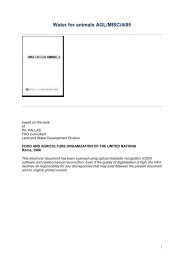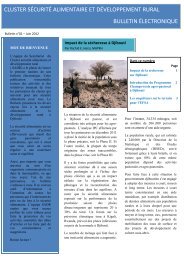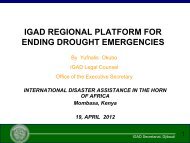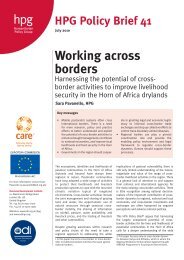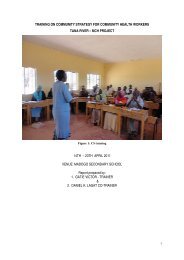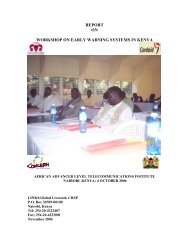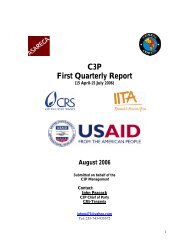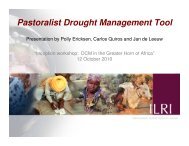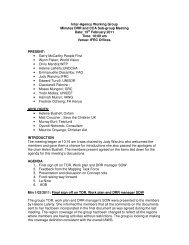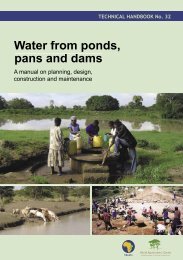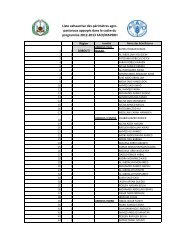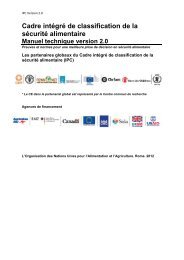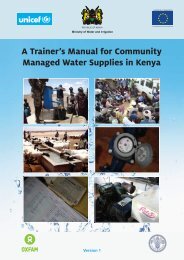Synthesis of Existing Knowledge and Experience on the Provision of ...
Synthesis of Existing Knowledge and Experience on the Provision of ...
Synthesis of Existing Knowledge and Experience on the Provision of ...
Create successful ePaper yourself
Turn your PDF publications into a flip-book with our unique Google optimized e-Paper software.
iv. More emphasis <strong>on</strong> involvingcommunities in management<str<strong>on</strong>g>and</str<strong>on</strong>g> maintenance <str<strong>on</strong>g>and</str<strong>on</strong>g> less inplanning. This may compromisebuy-in to schemes if planned inisolati<strong>on</strong> from community. Thisalso makes practiti<strong>on</strong>ersvulnerable to establishing waterpoints that may disrupt social<str<strong>on</strong>g>and</str<strong>on</strong>g> ecological patterns.d. Ensure participati<strong>on</strong> in allstages <str<strong>on</strong>g>of</str<strong>on</strong>g> waterdevelopment, whichimportantly includesplanning.* There are also notable overarching challenges including an unfavourable pastoral policy envir<strong>on</strong>ment, extremely ambitiousnati<strong>on</strong>al water development targets which may undermine quality in favour <str<strong>on</strong>g>of</str<strong>on</strong>g> quantity, <str<strong>on</strong>g>and</str<strong>on</strong>g> a dearth <str<strong>on</strong>g>of</str<strong>on</strong>g> skilled manpower inpastoral regi<strong>on</strong>s.Currently in Ethiopia, approaches to water development <str<strong>on</strong>g>and</str<strong>on</strong>g> community participati<strong>on</strong> are disjointedbetween different projects <str<strong>on</strong>g>and</str<strong>on</strong>g> programs, <str<strong>on</strong>g>and</str<strong>on</strong>g> also between different actors <str<strong>on</strong>g>and</str<strong>on</strong>g> sectors. In general,approaches range from highly technocratic, with generic methods <str<strong>on</strong>g>of</str<strong>on</strong>g> promoting participati<strong>on</strong> (<str<strong>on</strong>g>of</str<strong>on</strong>g>tentokenistic), to highly participatory approaches which are c<strong>on</strong>fined to specific spatial <str<strong>on</strong>g>and</str<strong>on</strong>g> sociopoliticalsettings. There is little coordinati<strong>on</strong> <str<strong>on</strong>g>and</str<strong>on</strong>g> knowledge sharing between different groups <str<strong>on</strong>g>of</str<strong>on</strong>g>actors. No comm<strong>on</strong> guidelines exist for <strong>the</strong> development <str<strong>on</strong>g>of</str<strong>on</strong>g> water for productive use in <strong>the</strong> pastoralc<strong>on</strong>text, <str<strong>on</strong>g>and</str<strong>on</strong>g> <strong>the</strong>re is also a need to streng<strong>the</strong>n linkages <str<strong>on</strong>g>and</str<strong>on</strong>g> improve complementarities betweenhumanitarian <str<strong>on</strong>g>and</str<strong>on</strong>g> development approaches <str<strong>on</strong>g>and</str<strong>on</strong>g> activities. Fur<strong>the</strong>rmore, most water developmentoccurs in isolati<strong>on</strong> from broader natural resource management, even though water is recognized asa key resource. Water is also <str<strong>on</strong>g>of</str<strong>on</strong>g>ten developed without due attenti<strong>on</strong> to o<strong>the</strong>r critical developmentneeds such as access to markets, health services for people <str<strong>on</strong>g>and</str<strong>on</strong>g> livestock, <str<strong>on</strong>g>and</str<strong>on</strong>g> educati<strong>on</strong>.Fur<strong>the</strong>r complicating matters is <strong>the</strong> dichotomy in macro-level thinking. On <strong>the</strong> <strong>on</strong>e h<str<strong>on</strong>g>and</str<strong>on</strong>g>, <strong>the</strong> policyenvir<strong>on</strong>ment in Ethiopia favours <strong>the</strong> settlement <str<strong>on</strong>g>of</str<strong>on</strong>g> pastoralists in <strong>the</strong> l<strong>on</strong>g term <str<strong>on</strong>g>and</str<strong>on</strong>g> <strong>the</strong> promoti<strong>on</strong> <str<strong>on</strong>g>of</str<strong>on</strong>g>irrigati<strong>on</strong> expansi<strong>on</strong>, seen by government as <strong>the</strong> <strong>on</strong>ly practical resp<strong>on</strong>ses to <strong>the</strong> challenges facingpastoralists in <strong>the</strong> rangel<str<strong>on</strong>g>and</str<strong>on</strong>g>s, <strong>on</strong> <strong>the</strong> o<strong>the</strong>r h<str<strong>on</strong>g>and</str<strong>on</strong>g>, d<strong>on</strong>ors, some government programmes <str<strong>on</strong>g>and</str<strong>on</strong>g> a fewdevelopment organizati<strong>on</strong>s favour supporting mobility as an essential pastoral coping strategy <str<strong>on</strong>g>and</str<strong>on</strong>g>promote <strong>the</strong> livelihood as a vehicle for ec<strong>on</strong>omic growth <str<strong>on</strong>g>and</str<strong>on</strong>g> development.Some shifts in water development thinking have been observed. Practiti<strong>on</strong>ers increasingly recognizethat:• Disjointed approaches to water development are an impediment to sustainable development in<strong>the</strong> rangel<str<strong>on</strong>g>and</str<strong>on</strong>g>s;• The lowl<str<strong>on</strong>g>and</str<strong>on</strong>g>s require a different approach to water development than <strong>the</strong> country’s agriculturalareas where rainfall is less spatially <str<strong>on</strong>g>and</str<strong>on</strong>g> temporally variable;• Mobility is an important means for pastoralists to resp<strong>on</strong>d <str<strong>on</strong>g>and</str<strong>on</strong>g> adapt to variable envir<strong>on</strong>ments;• Pastoral livelihoods are influenced by social, cultural <str<strong>on</strong>g>and</str<strong>on</strong>g> political aspects which differ within <str<strong>on</strong>g>and</str<strong>on</strong>g>between regi<strong>on</strong>s <str<strong>on</strong>g>and</str<strong>on</strong>g> must be properly understood;• Water points functi<strong>on</strong> within <strong>the</strong> broader l<str<strong>on</strong>g>and</str<strong>on</strong>g>scape <str<strong>on</strong>g>and</str<strong>on</strong>g> can alter patterns <str<strong>on</strong>g>of</str<strong>on</strong>g> resource use,underscoring <strong>the</strong> importance <str<strong>on</strong>g>of</str<strong>on</strong>g> underst<str<strong>on</strong>g>and</str<strong>on</strong>g>ing <strong>the</strong> existing natural resources in a locati<strong>on</strong> (water<str<strong>on</strong>g>and</str<strong>on</strong>g> pasture) <str<strong>on</strong>g>and</str<strong>on</strong>g> <strong>the</strong> way people use <strong>the</strong>se resources;• The s<str<strong>on</strong>g>of</str<strong>on</strong>g>tware comp<strong>on</strong>ent <str<strong>on</strong>g>of</str<strong>on</strong>g> water development requires much more focus if waterdevelopments are to be appropriate <str<strong>on</strong>g>and</str<strong>on</strong>g> sustainable, which means improving effectiveparticipati<strong>on</strong> in planning <str<strong>on</strong>g>and</str<strong>on</strong>g> implementati<strong>on</strong> <str<strong>on</strong>g>and</str<strong>on</strong>g> embedding <strong>the</strong> capacity at <strong>the</strong> local level tooperate, manage <str<strong>on</strong>g>and</str<strong>on</strong>g> maintain water points81



